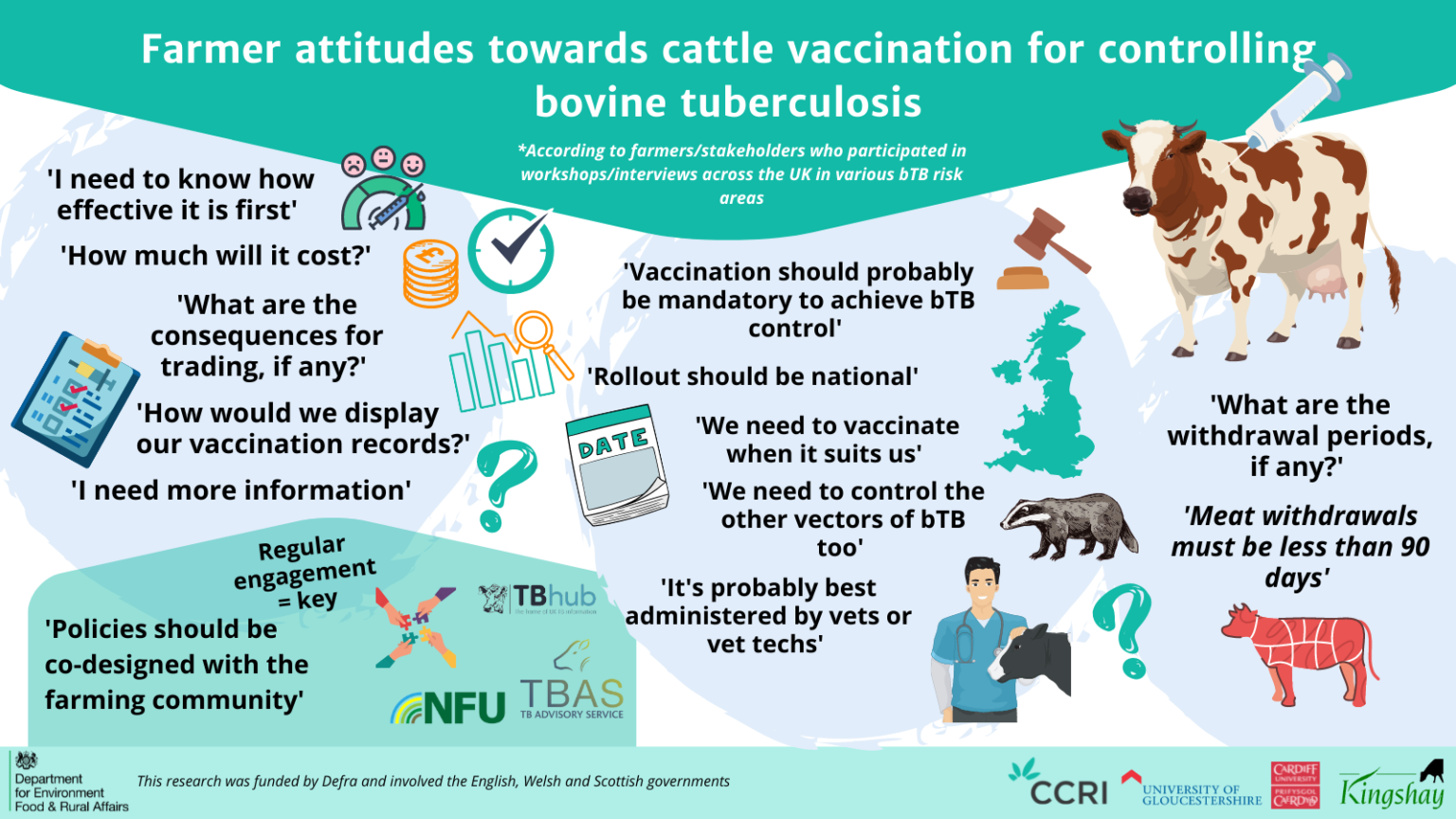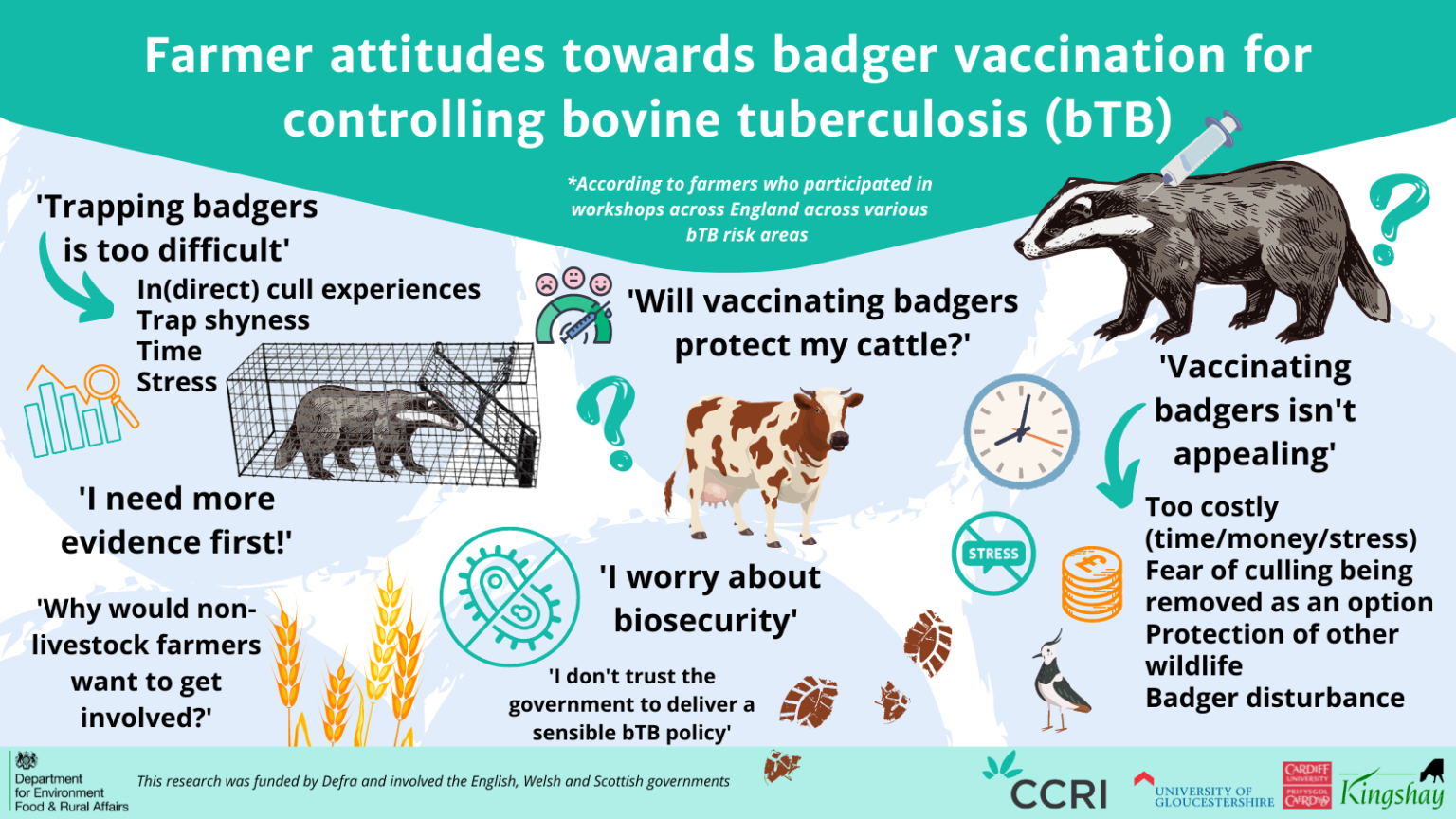Defra has published results of social science research exploring farmer attitudes in Great Britain to vaccinating cattle and badgers in England and Wales against tuberculosis (TB).
Key findings
Cattle TB vaccination
- Participants were generally supportive of an effective cattle TB vaccine, provided that it does not adversely affect trade.
- There is a need for clear, sustained messaging surrounding the policy for deployment of a cattle TB vaccine, particularly around vaccine efficacy and any potential implications for farm businesses.
- Involving farmers throughout the process of policy design is important.
- Participants favoured a mandatory and universal approach to cattle TB vaccination, with eventual national roll-out.

Badger TB vaccination
- Participants were not receptive to the idea of badger vaccination as a control method for TB due to a lack of trust in the government and the efficacy rates that would be achieved.
- Encouraging farmers to take part in badger vaccination will depend on establishing trust between the farming community and government.
- Fostering a more positive attitude to badger vaccination may be possible where:
- there is a clear approach for trapping badgers in a cost-effective way
- concerns around badger populations are addressed, with many participants claiming that current populations are unsustainably high
- there is no cost to farmers
- a trial is carried out in areas where the underlying rationale is clearly explained
- a proven efficacy of the vaccination, with protection rates likely to be achieved in cattle upon vaccinating badgers better understood and communicated
- vaccination is undertaken by trusted organisations
- biosecurity concerns are alleviated

Q&A
For cattle TB vaccination, the objectives were:
- To examine farmer attitudes, influences and decision-making processes to explore how attractive they find the potential future deployment of a cattle TB vaccine
- To identify risk factors and enablers that could influence and trigger change in farmer decision-making, including potential impacts that deployment of cattle TB vaccination might have on other bTB biosecurity behaviours
- To assess how vaccinating cattle against TB might impact the ease of cattle trading both within the UK (intra-trade) and internationally (export)
For badger TB vaccination, the objective of the research was to investigate farmers’ current and future attitudes towards vaccinating or facilitating the vaccination of badgers against TB in England.
The researchers developed three hypothetical policy scenarios for cattle TB vaccination. They conducted six workshops with cattle farmers in England and Wales alongside 35 interviews with industry stakeholders representing England, Wales and Scotland.
For badger vaccination, the researchers developed four hypothetical policy scenarios. They conducted four focus groups with farmers in locations representing all three TB risk areas in England.
For cattle TB vaccination, the scenarios were:
- Voluntary individual responsibility with farmers choosing whether to vaccinate
- Mandatory vaccination, government-led vaccination with penalties for not complying
- Voluntary collective responsibility with an industry-led delivery model, representing a similar approach to the one currently used for badger culling
For badger TB vaccination, the scenarios were:
- Government-led approach to badger vaccination with farmers expected to trap the badgers for vaccination
- Vaccination of badgers as part of a scientific trial
- Vaccinating of badgers in post-badger cull areas delivered by cull companies
- Cattle vaccination, dependent on combining with badger vaccination with both vaccines administered by veterinary technicians
Farmer workshops took place where participants were asked what their hopes and concerns were about cattle and badger TB vaccination. They were then asked about each hypothetical scenario where they shared their views and initial reactions with the group and were asked probing questions by the researchers.
There were also stakeholder interviews in which participants were presented with the same hypothetical scenarios. There were general questions to understand the profile and role of the interviewee, then discussion on the scenarios and questions about key points that were important to cattle TB vaccination and trade.
Both workshops and interviews were recorded and transcribed verbatim, then in-depth, thematic analysis was conducted. Key narratives, general understandings and sentiments were identified and represented in the findings.
Defra, Welsh Government and Scottish Government are using the results of this research to identify areas requiring additional discussion and engagement with stakeholders and to develop future policy options, where appropriate.
No, not yet. Field trials are ongoing aimed at securing UK marketing authorisations for a cattle TB vaccine (CattleBCG) and for a new skin test to detect infected among vaccinated animals (DIVA skin test). These field trials are funded through the GB bovine TB research & development budget on behalf of Defra, Welsh Government and Scottish Government.
Yes. There has been a UK marketing authorisation for BadgerBCG since 2010 and badgers are currently vaccinated under licence through various government-supported and privately funded initiatives.